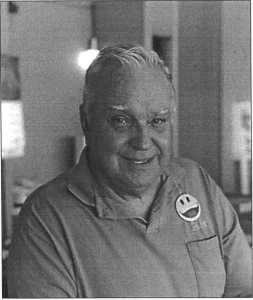Alexander M. Riviera

Tsunamis Remembered: Oral Histories of Survivors and Observers in Hawai‘i
Life history interviews with individuals who witnessed and survived tsunamis-particularly the 1946 and 1960 disasters on the Big Island of Hawai'i. Thirty individuals-mostly residents of Hilo and Laupahoehoe-recall their experiences before; during, and after the 1946 and 1960 tsunamis which were arguably the most destructive natural disasters in modem Hawaiian history.
The seventh of thirteen children, Alexander M. Riviera was born in Hakalau, Hawai'i on August 9, 1931. His father was John Fernando Rivera, who immigrated from Puerto Rico in 1901, and Mary Dejesus Rivera, who was of Spanish descent and born in Hawai'i. [Note: Alexander changed the spelling of his last name.] Like many laborers, Riviera's father took on contracts at various sugar plantations on the Big Island. Riviera and his siblings spent their childhoods living in sugar plantation camps at Hakalau, Kukuihaele, Papa'aloa, and Papa'ikou. During this time, Riviera attended Kulruihaele, John M. Ross, and Kalaniana'ole schools. In 1942, the family moved to Hilo and lived in WaWcea town. He then attended Waiakea Kai and Hilo Intermediate schools before graduating from Hilo High School in 1949. After graduation, Riviera worked at the Hawai'i News Print Shop for thirteen years. He later was employed by the Hilo Tribune-Herald and Island Instant Printing Center. Since 1998, Riviera has been manager of Concept Printing Professionals, a downtown Hilo company owned by his son. Riviera and his wife, Julie, whom he married in 1983, reside in Hilo. The oral history interview was conducted in Concept Printing Professionals on Kamehameha Avenue in the tsunami-inundation zone.
Scope and Content Note
A man remembers his parents and their nomadic lifestyle, moving from plantation to plantation. On April 1, 1946, in Waiakea town, he and a friend escaped from the third tidal wave. He discusses the loss of lives and property. Also covered is his role in unionizing the Hilo Tribune-Herald.
Program Note:
This interview is part of the Center for Oral History's project Tsunamis Remembered: Oral Histories of Survivors and Observers in Hawai‘i. Interviews from this project are available in the Center's ScholarSpace open access repository.
The Center for Oral History (COH), in the Department of Ethnic Studies at the University of Hawaiʻi at Mānoa, collects, documents, preserves and highlights the recollections of Native Hawaiians and the multi-ethnic people of Hawaiʻi. It produces oral histories and interpretive historical materials about lifeways, key historic events, social movements and Hawaiʻi’s role in the globalizing world, for the widest possible use.
Please Note: The oral histories in this collection are protected by copyright and have been created for educational, research and personal use as described by the Fair Use Doctrine in the U.S. Copyright law. Please reach out Voices@noaa.gov to let us know how these interviews are being used in your research, project, exhibit, etc. The Voices staff can help provide other useful resources related to your inquiry.
The NOAA mission is to understand and predict changes in climate, weather, oceans, and coasts, to share that knowledge and information with others, and to conserve and manage coastal and marine ecosystems and resources. The Voices Oral History Archives offers public access to a wide range of accounts, including historical materials that are products of their particular times, and may contain offensive language or negative stereotypes.
Voices Oral History Archives does not verify the accuracy of materials submitted to us. The opinions expressed in the interviews are those of the interviewee only. The interviews here have been made available to the public only after the interviewer has confirmed that they have obtained consent.
